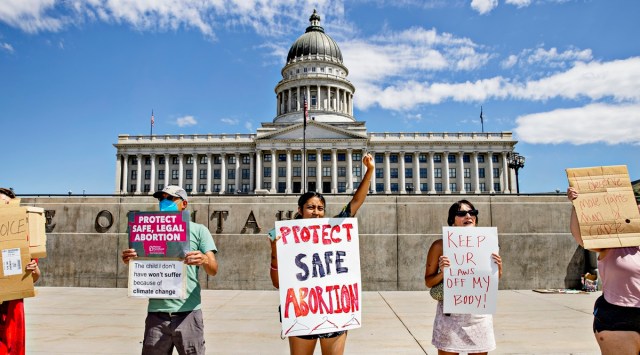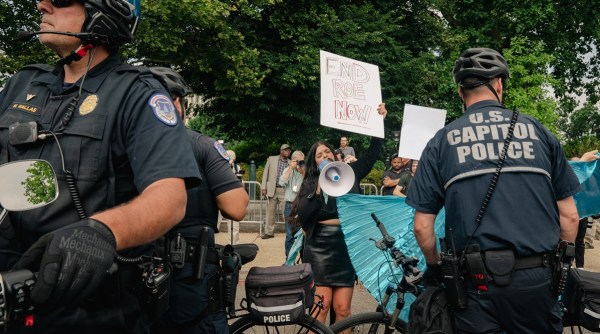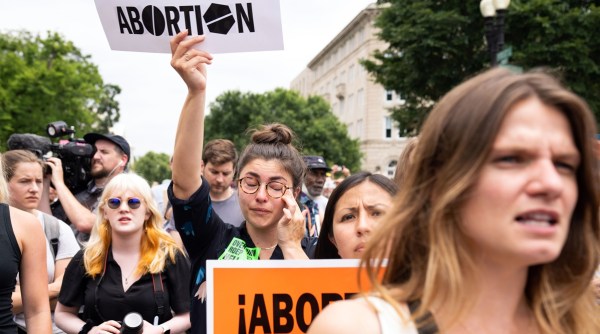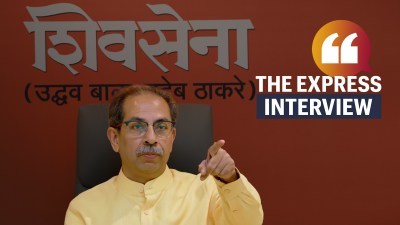- India
- International
‘It’s become real’: Abortion decision roils US midterms, sending fight to States
For years, the prospect of overturning Roe v Wade was an abstract concept for many Americans — a distressing but distant worry for some and a long-term goal rather than an imminent possibility to others.
 Abortion rights activists protest outside the Utah State Capitol in Salt Lake City on June 24, 2022. (File Photo: The New York Times/ Representational)
Abortion rights activists protest outside the Utah State Capitol in Salt Lake City on June 24, 2022. (File Photo: The New York Times/ Representational)Written by Katie Glueck
The Supreme Court’s decision overturning Roe v Wade on Friday catapulted the explosive battle over abortion rights into the centre of several marquee midterm races, turning the fight over key governor’s contests and coveted Senate seats into heated debates about personal freedom and public health.
Devastated Democrats, facing staggering political challenges amid high inflation and President Joe Biden’s low approval ratings, hoped the decision might reinvigorate disaffected base voters. They also saw the moment as a fresh chance to hold on to the moderate, suburban swing voters who have helped them win recent elections.
Republicans, for their part, publicly celebrated the ruling as the realisation of a decades-long effort, even as some strategists — and former President Donald Trump — privately acknowledged that the issue created at least some risk for a party that has enjoyed months of political momentum. Many argued that competitive races would ultimately be decided by other issues.
“From the grassroots perspective, there’s a lot of joy,” said Scott Jennings, a Republican who is a former top campaign aide to Sen. Mitch McConnell, R-Ky, the minority leader. “This is why we fight. And at the same time, this election is going to be decided on a couple of issues: Joe Biden’s approval rating, inflation, the economy, crime, quality of life.”

For years, the prospect of overturning Roe v Wade was an abstract concept for many Americans — a distressing but distant worry for some and a long-term goal rather than an imminent possibility to others. The Supreme Court’s opinion eliminating the constitutional right to an abortion ended that era of disbelief, opening a new chapter of concrete consequences, in which races for governor, state legislature and attorney general, and even state courts might determine whether millions of Americans have access to the procedure.
“This fall, Roe is on the ballot,” Biden said Friday. “Personal freedoms are on the ballot.”
Both parties agree that the high stakes will be galvanising, to some degree, to their respective bases. But the critical question remains whether swing voters — in particular, independent women from diverse suburbs, who are focused on economic uncertainty — will turn their attention to the fight over access to abortion.
“There are a lot of independent women. I think there are a lot of women who haven’t been participating in elections and are going to engage,” Gov Gretchen Whitmer of Michigan said earlier this week, after hosting an emotional roundtable focused on abortion rights at a brewery in Grand Rapids. “But I’m not going to assume it. We’re going to have to make sure that we’re doing the work of education and persuasion and activation.”
Already this year, Democratic campaigns and supportive outside groups have spent nearly $18 million in advertising on abortion issues, while Republicans and affiliated outside groups have spent nearly $21 million, according to media tracking firm AdImpact. Both figures may balloon.
Activists and party strategists, who have been preparing for months to mobilise around this issue, are focusing in particular on governor’s races in Michigan, Wisconsin and Pennsylvania, three states led by Democratic governors, and places where the outcomes this fall could directly affect the future of abortion rights after the Dobbs v. Jackson Women’s Health Organisation decision handed control over abortion protections back to the states.
 US Capitol Police keep a watchful eye as anti-abortion demonstrators and abortion rights advocates gather outside the Supreme Court in Washington on June 24, 2022. (Shuran Huang/The New York Times)
US Capitol Police keep a watchful eye as anti-abortion demonstrators and abortion rights advocates gather outside the Supreme Court in Washington on June 24, 2022. (Shuran Huang/The New York Times)
Democrats also are planning to use the issue to play offense in other governor’s races, while making the case that Senate and House candidates across the country, too, have embraced positions on abortion that are far outside the mainstream.
An early test of energy around this issue will come in August, as Kansans vote on whether to remove the right to an abortion from the state constitution.
In a fundraising email Friday, Gov Laura Kelly of Kansas, a Democrat, declared that “I could be the only Kansas leader standing in the way” of new abortion restrictions. Her likely opponent, state Attorney General Derek Schmidt, said that he would support the ballot initiative.
Democrats had been preparing to try to direct the expected outpouring of shock and anger into electoral action once the opinion was handed down, with party committees and state parties conferring on national messaging and mobilisation plans, as well as launching a website Friday to direct organising efforts.
 An abortion-rights advocate wipes away a tear as she joins in a protest outside the Supreme Court in Washington on June 24, 2022. (Haiyun Jiang/The New York Times)
An abortion-rights advocate wipes away a tear as she joins in a protest outside the Supreme Court in Washington on June 24, 2022. (Haiyun Jiang/The New York Times)
Candidates and organisations have employed focus groups and polling to assess the issue; there are sprawling fundraising efforts; and abortion rights groups Planned Parenthood Action Fund, NARAL Pro-Choice America and Emily’s List have said they intend to spend $150 million on the midterm elections. American Bridge 21st Century, a Democratic-aligned super PAC, says it has tapped social media influencers to communicate about abortion rights and Republican records on that issue to Americans who may be only casually political.
“We will see, state by state by state, preexisting bans go into effect, state legislatures rush to pass abortion bans,” said Cecile Richards, the former president of Planned Parenthood who is now a chair of American Bridge. “It’s a different conversation now because it’s become real.”
Despite all the mobilisation, many party strategists do not anticipate that even Friday’s seismic decision will fundamentally change voters’ focus on cost-of-living worries. But some see it as reinforcing their core argument against Republicans: that the right-wing of the party is in control, out of step with public opinion, and focused above all else on cultural battles. Senate Democrats and strategists are particularly focused on highlighting the Republican candidates who support near-total bans on abortion.
“Economic issues are always going to outweigh abortion for a lot of voters,” said Celinda Lake, a veteran Democratic strategist. “But it’s very, very important for Democrats — to win these swing voters — to make this a choice, not a referendum.”
Polling shows that Americans strongly oppose completely overturning Roe v Wade — in a Washington Post-ABC poll conducted in late April, 54% of Americans thought the Roe decision should be upheld, while 28% believed it should be overturned. But views on abortion vary depending on a state’s political tilt.
That is one reason Republicans’ messaging on the issue has been less unified. On Friday, as some candidates, lawmakers and the Republican National Committee rushed to celebrate the ruling, others sought to quickly return their focus to pocketbook issues.
Adam Laxalt, the Republican Senate candidate in Nevada — a state with a history of supporting abortion rights — on Friday cheered the “historic victory for the sanctity of life” but stressed that access to abortion was already “settled law” in Nevada.
“It won’t distract voters from unaffordable prices, rising crime or the border crisis,” he said.
My statement regarding the Supreme Court’s decision overturning Roe v. Wade: pic.twitter.com/j87yCgLrun
— Adam Paul Laxalt – US Senate Candidate (@AdamLaxalt) June 24, 2022
When asked for comment, Jesse Hunt, a spokesperson for the Republican Governors Association, responded in a statement that “the persuadable voters that will determine the outcome in competitive races are deeply concerned with the damage being done to their financial security” by Democrats.
Even Trump, the former president who put conservatives on the court, has privately told people that he believes the court’s decision will be “bad for Republicans.” In a public statement Friday, Trump called the decision “the biggest WIN for LIFE in a generation.”
Abortion rights opponents are working to capitalise on conservatives’ enthusiasm.
Anti-abortion rights group Susan B Anthony Pro-Life America launched a field program last year, with plans to engage 8 million voters in critical battleground states. The group is focusing on “those people that are in play, that could go either way based on this particular issue,” said Marjorie Dannenfelser, president of the organisation.
For the Pro-Life Movement, this is a culminating moment of 50 years of what we believe is the greatest human rights movement of our time.
Our president @marjoriesba joins @JudyWoodruff on @NewsHour to discuss the Supreme Court’s decision overturning Roe:#LifeIsAHumanRight pic.twitter.com/4PuBatYmlg
— SBA Pro-Life America (@sbaprolife) June 25, 2022
“It’s not just some theoretical vote about somebody who says they’re pro-life,” she said. “It’s now an opportunity to actually do something about it.”
Penny Nance, president of Concerned Women for America, an organisation that opposes abortion rights, said the group was planning a summit that would focus on the role of state activism in a post-Roe nation.
Some state officials have “basically said, ‘We don’t really have the ability to change the law because of the Supreme Court decision,’” she said.
“Now,” she continued, “it changes everything.”
.@PYNance, President of @CWforA, comments on the overturning of the #RoeWade Supreme Court decision, a momentous victory for the pro-life movement in America. pic.twitter.com/HJCUtpwdAn
— The Daily Signal (@DailySignal) June 24, 2022
That new focus on state laws has already intensified the debate in statehouses and governor’s races in politically divided states. In Pennsylvania, the next governor and a Republican-led statehouse will likely determine access.
“Roe v Wade is rightly relegated to the ash heap of history,” said Doug Mastriano, the far-right Republican nominee for governor in Pennsylvania. Josh Shapiro, the state attorney general and the Democratic nominee for governor, wrote on Twitter on Friday that “without Roe, the only thing stopping them is the veto pen of our next Governor.”
In Michigan and Wisconsin, old laws on the books call for near-total bans on abortion, and Democratic governors up for reelection have vowed to fight to protect access.
In Michigan, abortion rights supporters are working to secure a constitutional amendment protecting the right to an abortion. Whitmer has also filed a lawsuit asking “the Michigan Supreme Court to immediately resolve” whether the state constitution protects the right to an abortion.
At her roundtable discussion this week, Whitmer spoke with women about whether they thought voters had yet grasped the significance of what overturning Roe v Wade would mean.
“So many people,” one attendee told her, “didn’t realise it was this serious.”
Apr 20: Latest News
- 01
- 02
- 03
- 04
- 05






































